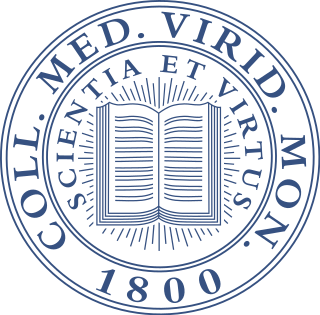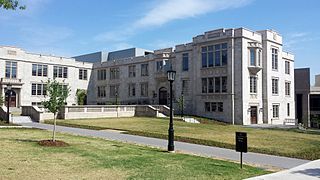
The University of California, San Francisco (UCSF) is a public land-grant research university in San Francisco, California. It is part of the University of California system and is dedicated entirely to health science and life science. It conducts research and teaching in medical and biological sciences.

Washington University in St. Louis (WashU) is a private research university in St. Louis, Missouri, United States. Founded in 1853, the university is named after George Washington, the first president of the United States.
An internship is a period of work experience offered by an organization for a limited period of time. Once confined to medical graduates, internship is used to practice for a wide range of placements in businesses, non-profit organizations and government agencies. They are typically undertaken by students and graduates looking to gain relevant skills and experience in a particular field. Employers benefit from these placements because they often recruit employees from their best interns, who have known capabilities, thus saving time and money in the long run. Internships are usually arranged by third-party organizations that recruit interns on behalf of industry groups. Rules vary from country to country about when interns should be regarded as employees. The system can be open to exploitation by unscrupulous employers.

Middlebury College is a private liberal arts college in Middlebury, Vermont. Founded in 1800 by Congregationalists, Middlebury was the first operating college or university in Vermont.

The Warren Alpert Medical School is the medical school of Brown University, located in Providence, Rhode Island. Originally established in 1811, it was the third medical school to be founded in New England after only Harvard and Dartmouth. However, the original program was suspended in 1827, and the four-year medical program was re-established almost 150 years later in 1972, granting the first MD degrees in 1975.
The Doctor of Medicine–Doctor of Philosophy (MD–PhD) is a dual doctoral program for physician–scientists, combining the professional training of the Doctor of Medicine degree with the research program of the Doctor of Philosophy degree.
Sutter Health California Pacific Medical Center (CPMC) is a general medical/surgical and teaching hospital in San Francisco, California. It was created by a merger of some of the city's longest established hospitals and currently operates three acute care campuses.

Medical education in the United States includes educational activities involved in the education and training of physicians in the country, with the overall process going from entry-level training efforts through to the continuing education of qualified specialists in the context of American colleges and universities.
The Liaison Committee on Medical Education (LCME) is an accrediting body for educational programs at schools of medicine in the United States and Canada. The LCME is sponsored by the Association of American Medical Colleges and the American Medical Association.

The Priscilla Chan and MarkZuckerberg San Francisco General Hospital and Trauma Center (ZSFG) is a public hospital in San Francisco, California, under the purview of the city's Department of Public Health. It serves as the only Level I trauma center for the 1.5 million residents of San Francisco and northern San Mateo County. It is the largest acute inpatient and rehabilitation hospital for psychiatric patients in the city. Additionally, it is the only acute hospital in San Francisco that provides 24-hour psychiatric emergency services.
William Francis Ganong Jr. was an American physiologist at the University of California, San Francisco (UCSF), and was one of the first scientists to trace how the brain controls important internal functions of the body.

Russ Biagio Altman is an American professor of bioengineering, genetics, medicine, and biomedical data science and past chairman of the bioengineering department at Stanford University.

The Honors College at the University of Arkansas enhances the learning of students by sharing unique learning experiences with participants. From 10 to 15% of Arkansas undergraduates participate in the Honors College. Entering freshman for the Honors College have an average score of 30 on the ACT and 4.1 high school GPA. Honors students benefit from smaller classes, priority registration, special housing and opportunities for hands-on research. Each year the Honors College awards up to 90 freshman fellowships worth $72,000 over four years and more than $1 million in research, study abroad, service learning and internship grants. The U.S. News & World Report highlighted the Honors College as one of six institutions in the country that offer a high quality education at a low cost, focusing on the valuable opportunities and connections available to students in the program. The Honors College serves all undergraduate majors.
Brian T. Andrews is a neurosurgeon specializing in pediatric neurosurgery, minimally invasive spinal surgery, brain tumors, neuro-oncology, neurotrauma, spinal stenosis and general neurosurgery. He is chairman of the Department of Neurosciences at California Pacific Medical Center and a founder of the California Pacific Neuroscience Institute.
College Possible is a nonprofit AmeriCorps organization making college admission and success possible for low-income students in the United States through an intensive curriculum of coaching and support. Its model uses recent college graduates serving an AmeriCorps term of service as near-peer mentors for students lacking the social resources to successfully enroll in and graduate from college. Headquartered in Saint Paul, Minnesota, the organization serves students in all 50 states with offices located in the Minneapolis-Saint Paul metro area, Chicago, Milwaukee, Omaha, Portland, Philadelphia and Seattle.
QuestBridge is a national nonprofit based in Palo Alto, California. Its goal is to connect low-income and first-generation students with partner colleges and universities.

edX is a US for-profit online education platform owned by 2U since 2021. The platform's main focus is to manage a variety of offerings, including elite brand bootcamps.

2U, Inc. is an American educational technology company that contracts with non-profit colleges and universities to build, deliver and support online degree and non-degree programs. It is also the parent company of edX. On February 12, 2024, 2U announced "there is substantial doubt about its ability to continue as a going concern."
The UCSF School of Medicine is the medical school of the University of California, San Francisco and is located at the base of Mount Sutro on the Parnassus Heights campus in San Francisco, California. Founded in 1864 by Hugh Toland, it is the oldest medical school in California and in the western United States. U.S. News & World Report ranked the school fifth in research training and fifth in primary care training. Six members of the UCSF faculty have received the Nobel Prize in Physiology or Medicine and five have received the National Medal of Science.

Nevan J. Krogan is a Canadian molecular and systems biologist. He is a professor and the Director of the Quantitative Biosciences Institute (QBI) at the University of California San Francisco (UCSF), as well as a senior investigator at the J. David Gladstone Institutes.











